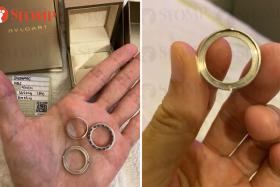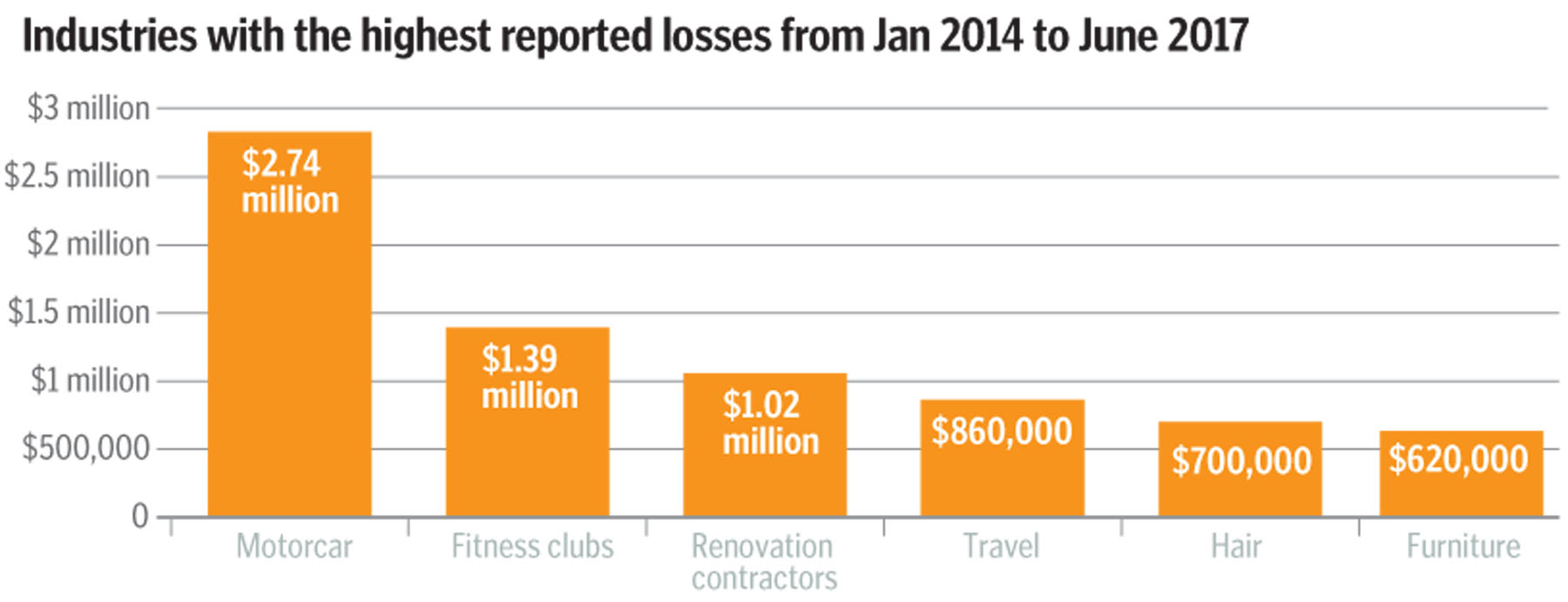Consumers' prepayment losses ballooned to $3.59m in 2016
Case reveals that sums lost after businesses shut have risen from $1.05 million in 2014 to $3.59 million last year
There has been an "alarming rise" in the amount of prepayments reported lost by consumers due to businesses suddenly shuttering over the past three years, said the Consumers Association of Singapore (Case) yesterday.
The total reported figure since January 2014 stands at $8.35 million and involves over 2,000 complaints of companies closing down and failing to deliver on goods or services after collecting payment.
This trend could continue with the current uncertain economic outlook, Case president Lim Biow Chuan warned.
In 2014, there was a reported loss of $1.05 million. It rose to $1.9 million in 2015. Last year, the figure ballooned to $3.59 million.
In the first half of this year, there has already been $1.81 million reported lost by consumers.
The industry with the highest amount of reported losses since January 2014 is the motorcar industry, at $2.74 million.
This included a customer who paid a $60,000 deposit to motor firm TLC Cars last year for a vehicle that cost $143,800, Case told The New Paper.
But the delivery of the car was repeatedly delayed, and the customer tried contacting TLC Cars via phone and text messages, but to no avail.
The firm eventually closed its doors last November, leaving the customer and at least nine others in the lurch.
Another customer had a similar experience after he agreed to buy a new car for $100,000 from Royal Automotive in January this year and paid a $20,000 deposit, said Case.
He was informed that the car would be delivered the following month, but he had a hard time contacting the company afterwards.
When he visited the showroom two weeks later, he was shocked to find that the company had closed down.
'ONLY A FRACTION'
Mr Lim, who is also MP for Mountbatten, said: "As not all affected consumers lodged their complaints with Case, these reported losses may represent only a fraction of the actual losses of consumers in Singapore."
For example, Case received about 600 complaints totalling $1.09 million in losses when fitness chain California Fitness closed down in 2015.
The amount was only 5 per cent of the $20.8 million in unused gym access and personal training sessions - involving 27,000 members - that was reported by the liquidators, said Mr Lim.
He urged customers to be more aware of how they can make prepayments, such as negotiating for progressive payments instead of making full payment up front.
Customers can also choose "pay-as-you-use" options and avoid prepaid packages that involve large sums or long periods.
Case also urged consumers to find out if a business offers any insurance to protect prepayment, such as a refund policy.
Mr Lim added that the association will continue to better protect customers by partnering with more industry associations via its CaseTrust accreditation scheme, which requires applicants to implement consumer-friendly policies, have proper dispute resolution procedures, conform to ethical advertising practices and provide structured training for staff members.
Companies also have to take up a $50,000 insurance bond to protect consumers' deposits in the event of an unresolved dispute.
But Professor Wong Poh Kam of the National University of Singapore Business School said a company's size, reputation or accreditation do not guarantee it will not close down.
"It is about being more prudent with how you make payment," he said.
Here's how to guard against prepayment losses
With about $8.35 million lost by customers in prepayments to shuttered companies over the past three years, customers must better protect themselves, said the Consumers Association of Singapore (Case).Here are some of its recommendations:
1. NEGOTIATE
Always negotiate to make payment in stages instead of making full payment up front.
For example, when signing a renovation contract, request to only pay 10 per cent of the total sum as a deposit with another 80 per cent to be paid as each stage of the work is completed.
The remaining 10 per cent can then be paid 14 days after satisfactory completion.
For cars, The New Paper spoke to three parallel importers who said they usually ask for about 20 per cent deposit.
2. INSURANCE
Those looking to sign up with spa and wellness establishments should look for those with CaseTrust accreditation.
Their prepayment is protected by the Trust Card Programme, which is set up by smart card system operator ez-link.
The money paid will go into a fund managed by ez-link and will be dispensed to the participating company each time a spa session is redeemed.
Should the operator go bust, ez-link will return the funds not utilised.
3. PAY AS YOU USE
Fitness junkies who visit gyms may choose to pay the fees monthly or with each visit instead of a prepaid package.
4. REFUND POLICY
Review the refund policy to understand the circumstances where you are entitled to a refund.
5. PAYMENT METHODS
If you are paying by credit card, you may apply to the card issuer to recover the prepayments through the chargeback mechanism for undelivered goods or services.
Get The New Paper on your phone with the free TNP app. Download from the Apple App Store or Google Play Store now




